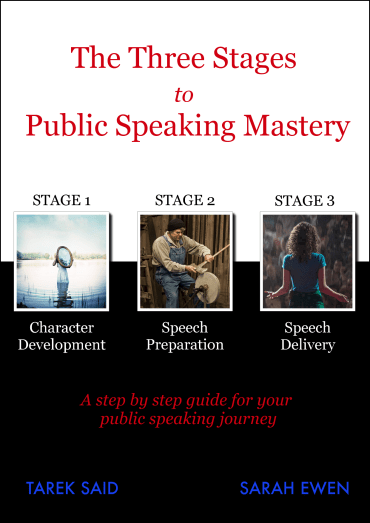SEVEN TIPS TO BUILD CONFIDENCE IN PUBLIC SPEAKING
In the final part of this three part series on the importance of confidence in public speaking, we want to share with you tips and practical tools that can help you to build confidence as a public speaker. As we mentioned in part one, one thing which unites all speakers is the ongoing need for confidence.
When it comes to confidence, ‘build’ is the key word. ‘Build’ indicates that gaining confidence is a gradual, step-by-step, experience-by-experience process. The great news is it does not necessarily need to be a slow process!
Here are seven ways to be build your confidence as a speaker:
1. Deal with any negative past public speaking experiences.
You may have experienced an extended awkward pause and wished the ground would swallow you up. Or perhaps you have literally fainted under the pressure. Regardless of the severity of the negative experience, the flash-backs can cause you to freeze or throw up at even the thought of ever speaking publicly again. Like with any negative experience you get to make a choice. Will you allow it to impact your future and define you or will you face it, deal with it and move on? It may be as simple as deciding not to replay it in your mind anymore. Or you may need the help of someone else to move past it. You can’t move forward and build confidence as a public speaker if you are haunted by negative experiences.
2. Draw on positive past speaking experiences
Whilst it may be a very different type and size of audience, or a different speech topic, drawing on positive past public speaking experiences is very effective in building your confidence for your next speech/presentation. If you could do it then, you can do it again! It is often easy to forget an event that went really well. It is therefore recommended you write down when it is fresh in your mind what you did well, why you think you succeeded and any uplifting feedback received from others. As part of your preparation for your next event, you can then refer back to your notes, recall the past event and adrenaline high you felt and this can boost your confidence.
3. Watch yourself on camera and write down the things you like
Watching yourself on camera is such an effective way of getting an appreciation and insight into what the audience experiences when you speak. However, only reviewing your recording identifying all things you need to fix is only one side of the coin. It is important to review your footage and identify what you like about your speaking as well. Carrying out this form of analysis helps to ensure you don’t get completely overwhelmed by all you feel you need to fix. Focusing on what you liked and ideally writing this down will boost your confidence.
4. Don’t compare yourself to others, learn what you can and move on
Comparison can be very destructive in your confidence building process. There are always going to be people around you or those you admire that you may consider are ‘better’ than you. But that is no reason to give up or feel down! No one else can speak the way you do. Learn what you can from others and move on. Don’t waste your time and energy constantly measuring and benchmarking yourself against others. One practical way to do this is to monitor your social media usage. For example, if looking at your Facebook causes you to compare yourself, limit how much you look at it. Comparison generally causes you to focus on what you don’t have and what you are not good at. Don’t let comparison be a distraction. No-one sounds, has the same sense of humour or the same thoughts to share as you. Draw and build confidence from what makes you uniquely you as speaker.
5. Back yourself with your words
Words are powerful. What you say about yourself will shape your future. Speaking really critically of yourself as a speaker can be a huge hindrance in building your confidence and negativity is not attractive. Instead back yourself with your words. You may not be where you want to be yet but tearing yourself down is not going to help. It is possible to speak honestly and openly about your speaking abilities without any fluff and putting a positive spin on it which will build you up. Think of negative words as leaving a horrible taste in your mouth. Remember if you can’t say something positive about yourself as a speaker you may be best not to say anything at all. If you want to build confidence back yourself with your words.
6. Confidence and arrogance are different – don’t fear being confident
Whilst there is a point in which the scale can tip from confidence to arrogance, if you are concerned as a confident speaker in any way that the audience may perceive your confidence as arrogance don’t be. The fact that you are concerned says it all! Arrogant people are not concerned at all about the audience’s perception as sadly they are so consumed and focused on themselves. If you have a healthy mindset and attitude as a speaker you won’t come across as arrogant. You therefore don’t need to fear how your confidence will be perceived which in turn will help you to embrace and build your confidence.
7. Practice
You have confidence when you know you can do something. Many people just don’t practice enough in front of an audience in a friendly environment where their is no consequences if mistakes are made. If you want to build your confidence as a speaker be intentional about investing time in developing your speaking skills. It is a skill you want to know you have in good time ahead of a public speaking event as opposed to either panicking before an event having to learn the skill at high speed or going to extreme measures to avoid the event altogether because you are not confident in your speaking abilities. Practicing will help you master the art of public speaking and this is the key reason why we run public speaking courses – to allow speakers like you to practice which will build your confidence. Practice results in progress and your confidence gets built when you know you are making progress.
We hope this three part series on confidence has been helpful and remember, the importance of confidence in public speaking should never be underestimated.

